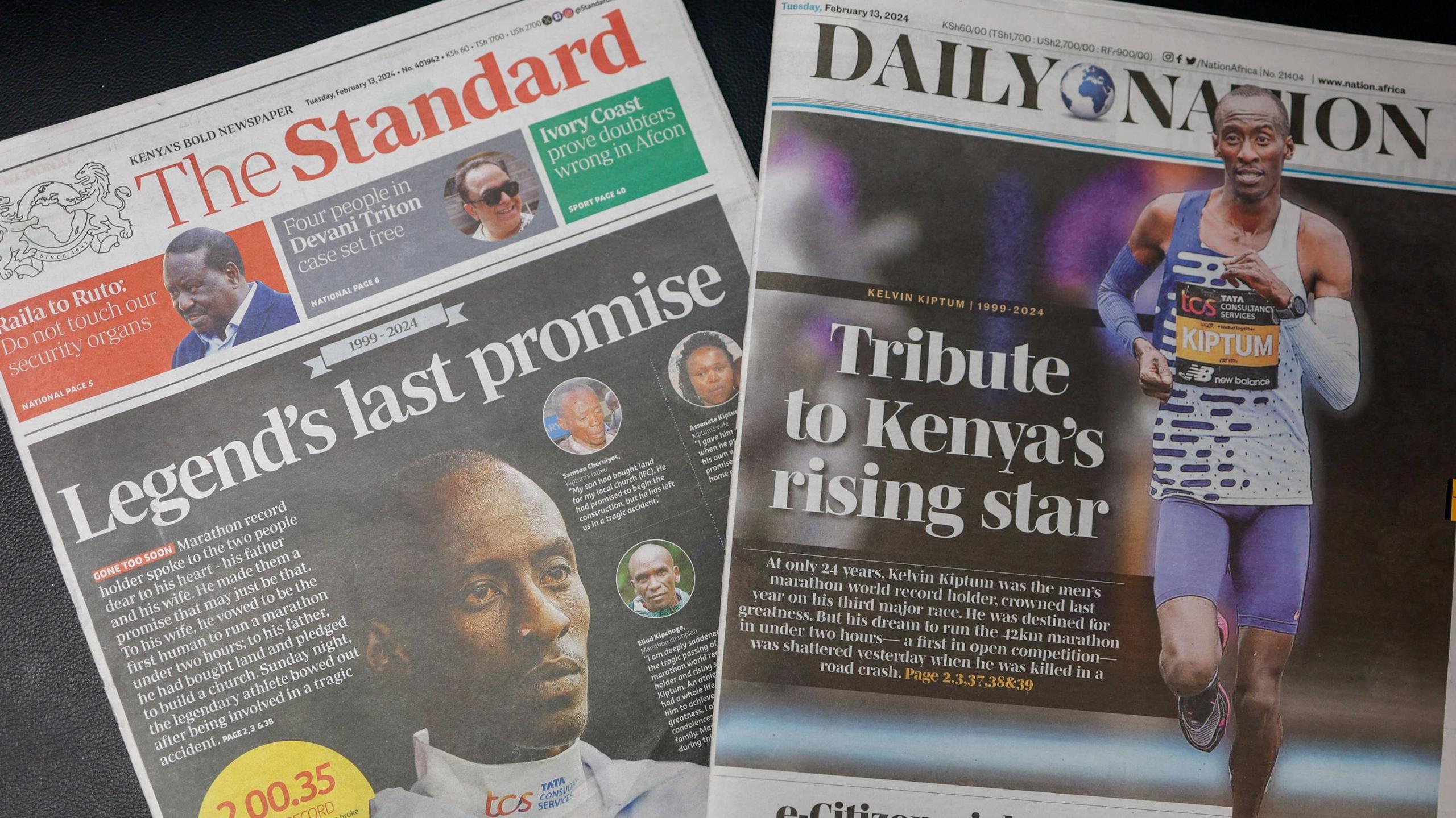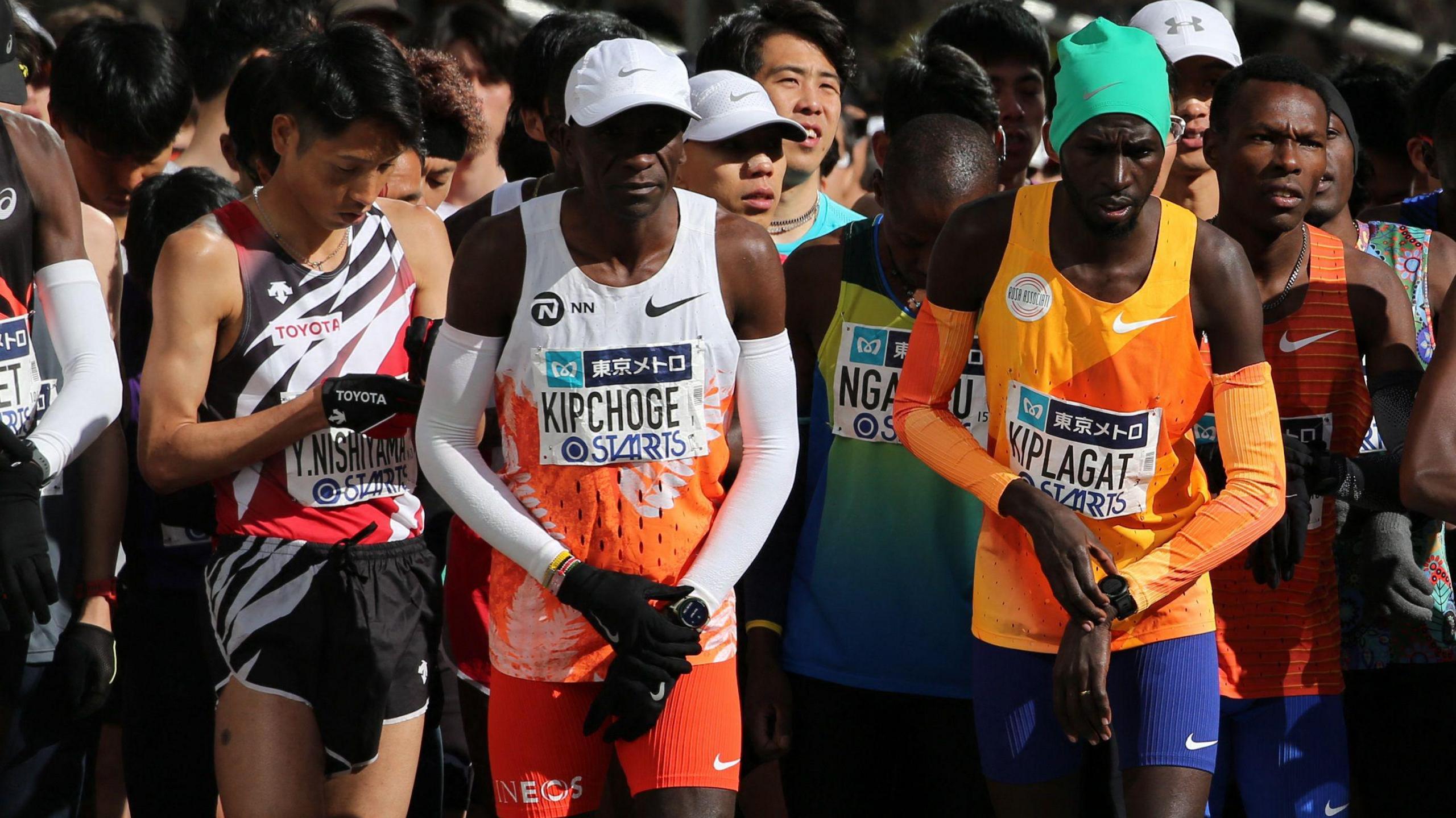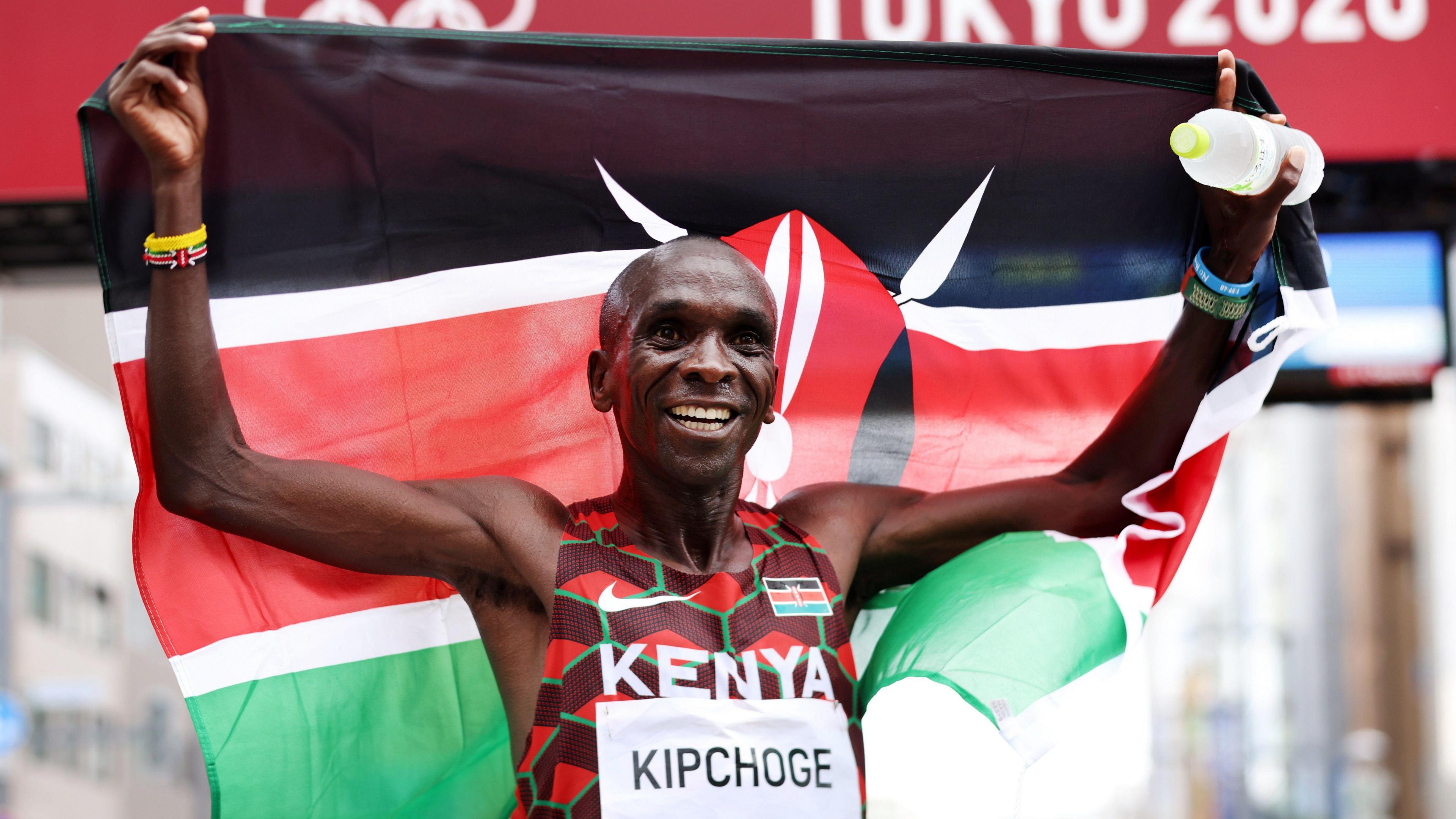'I don't trust anyone' - How trolling hurt Kipchoge
Eliud Kipchoge described 12 February, the day Kelvin Kiptum died, as the "worst day" in his life
- Published
Two-time Olympic champion Eliud Kipchoge says he feared for the lives of his family during a campaign of online abuse that wrongly linked him to the death of fellow Kenyan marathon runner Kelvin Kiptum.
Kiptum, the world record holder who looked set to challenge Kipchoge's dominance over 26.2 miles, died aged 24 in a car crash in February.
Some social media users began to speculate that Kipchoge was part of a conspiracy to kill Kiptum, who had lowered the world best to two hours, 35 seconds last October in Chicago.
"I was shocked that people [on] social media platforms are saying 'Eliud is involved in the death of this boy'," the 39-year-old told BBC Sport Africa.
"That was my worst news ever in my life.
"I received a lot of bad things; that they will burn the (training) camp, they will burn my investments in town, they will burn my house, they will burn my family.
"It did not happen but that is how the world is."
Kipchoge's initial reaction when he saw the abuse and false rumours was to check whether his family were safe.
"I don't have power to go to police and tell them my life is in danger. So my concern was actually to tell my family to be extra conscious and cautious," he said.
"I started to call a lot of people.
"I got really scared of my children going to school and coming back.
"Sometimes they bike around, but we had to stop them because you never know what will happen. We started to drop them [off] and pick them [up] in the evening.
"My girl was in boarding school - that was positive that she had no access as far as social media is concerned - but it’s tough for my boys to hear 'Your dad has killed somebody'."
Losing friends and trust

Kelvin Kiptum broke Kipchoge's marathon world record in Chicago last October, but died in an accident just four months later
Kipchoge was overtaken by emotion during a candid interview at his home in Eldoret when discussing the impact the campaign of abuse had on his mother.
"My worst moment was (when) I tried to call my mum," he said.
"She told me 'Just take care' and 'A lot has been going on'.
"Where I come from is a really local area. And with the age of my mum, I really realised that social media can go everywhere.
"But she gave me courage. It was really a tough month."
However, Kipchoge, who became just the third person to win successive Olympic marathons when he defended his title in Tokyo in 2021, decided not to take precautions over his own safety.
"I saw no meaning to change training venues because my life is open," he explained.
"Our sport is not training in the gym, it is going outside to run. I walk in the streets freely."
Kipchoge claims he "lost about 90%" of his friends amid the wrongful link to Kiptum's accident and online abuse.
"It was really painful for me to learn even from my own people, my training mates, those who I have contact with, and the bad words are coming from them," he added.
"I was really down to see that."
An impact on performance

Kipchoge says the online abuse caused sleepless nights and hindered his performance in March's Tokyo Marathon
Kipchoge's team decided to take the distance runner off social media in the wake of the abuse, but he said he never considered deleting his accounts.
"If I delete my accounts then it shows that there is something I am hiding," he said.
"I will keep my accounts. I did not do anything."
However, he believes the social media abuse affected his performance in competition.
Kipchoge came 10th in the Tokyo Marathon on 3 March, his lowest finish since his debut in 2013, crossing the line over two and a half minutes behind the winner Benson Kipruto.
"When I was in Tokyo I had three days which I did not sleep," he revealed.
"It was my worst ever position."
Despite that setback he was named in Kenya's marathon team for the Paris 2024 Olympics last Wednesday, and is now focused on creating more history at the Games as he aims to win a third successive gold medal.
"It's about getting up and going straight again, to your goal," added Kipchoge, who in 2019 became the first person to run a marathon in under two hours, albeit in controlled conditions in Vienna.
"I want to go into history books, to be the first human being to win back-to-back-to-back."
Cutting down on abuse at Paris 2024

Kipchoge is aiming to become the first person to win three Olympic marathon titles in a row, having triumphed in Rio de Janeiro in 2016 and Tokyo in 2021
Having been on the receiving end of intimidation and threats, Kipchoge believes social media companies are "not doing much" to clamp down on abuse on their platforms.
"These faceless people are posting bad things and are really dangerous," he said.
"If you report some accounts then it takes time for them to delete those accounts.
"They should act fast, get the facts, delete accounts. People [should] know that if you say something which is not good then your account will be deleted."
However, Kipchoge has welcomed an announcement from the International Olympic Committee that it plans to "respond proactively and at scale" to safeguard athletes from online abuse during Paris 2024.
The IOC intends to use artificial intelligence, external to help identify abusive posts and report them to social media companies.
"I think it's actually the right direction," he said.
"They are now stamping their authority and their function as an organisation handling the athletes to safeguard them from abuse."
But, for Kipchoge, it is already too late to avoid the emotional scarring he has suffered.
"I learned that friendship cannot be forever," he said.
"I think it's unfortunate that it happened when I'm celebrating over 20 years in sport.
"What happened has [made] me not trust anybody. Even my own shadow, I will not trust."